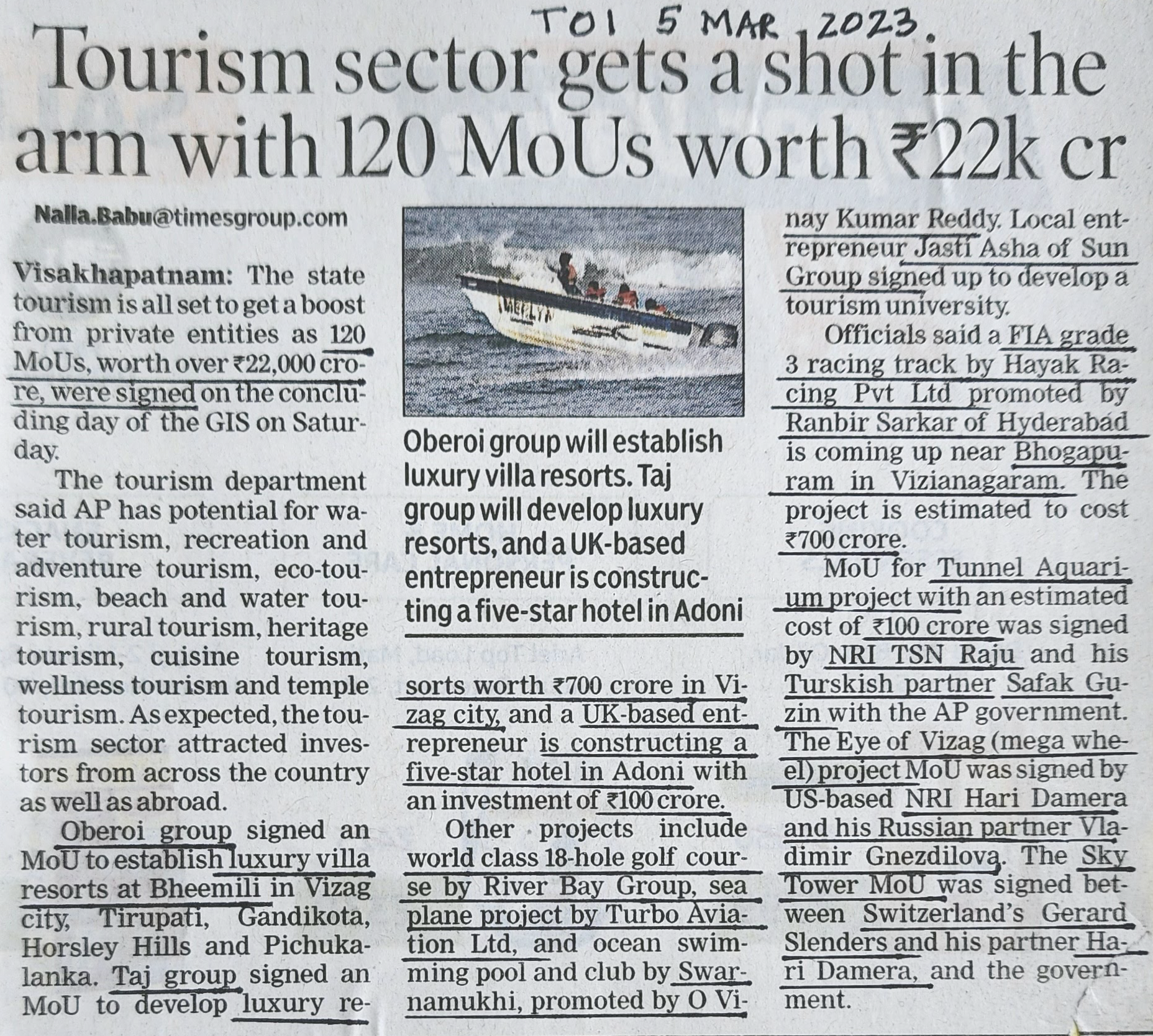
Beach Projects In AP Coast Must Be A Few And Sustainable
Andhra Pradesh, with its stunning coastline stretching over hundreds of kilometres, has immense tourism potential. To harness this potential, the state's tourism authorities aim to develop a Coastal Tourism Master Plan, adhering to the Coastal Zone Management Plan (CZMP) 2019. While the desire to boost tourism is understandable, it is essential to strike a delicate balance between development and preserving the natural beauty and ecology of our beaches. The recent discussions about including tourism plans within the CZMP regulations raise concerns among environmentalists and citizens who fear the adverse impacts on our precious coastal ecosystem.
The CZMP notification permits tourism facilities along the coastal areas, provided they integrate into the approved CZMP. However, this has been a point of contention for Andhra Pradesh Tourism, as they believe it constrains their ability to realize the full tourism potential and restricts investments in tourism projects. They argue that incorporating tourism plans within the CZMP will enable them to obtain approvals for tourism infrastructure, leading to well-maintained beaches with sustainable tourism activities, enhancing the experience for visitors.
The Vizag District Collector's call for a meeting tomorrow, 5th August, to discuss these plans is commendable, as it aims to involve various government departments. However, the lack of representation from general non-business citizens, environmentalists and tourism experts raises concerns. The absence of stakeholders with expertise in sustainable tourism may lead to ill-advised decisions that could have severe long-term consequences on the coastal ecosystem.
One of the concerns raised by environmentalists is the potential damage to the coastal ecosystem due to unchecked development. The rapid proliferation of hotels and resorts near the beaches could lead to habitat destruction, impacting marine life and the natural balance of the ecosystem. With increased footfall, there is also a risk of more litter and single-use plastics being introduced, posing a threat to marine animals and seabirds.
Sea level rise due to climate change is a critical factor that cannot be overlooked while discussing the development of coastal tourism in Andhra Pradesh. The melting of polar ice caps and thermal expansion of seawater pose a significant risk to our coastal areas, including the beaches. Without proper consideration of this issue, investing in large-scale tourism projects near the coast could lead to submersion and erosion. Climate change impacts are already evident, and it is vital for the government and stakeholders to include climate resilience in their coastal tourism master plan. This entails implementing adaptive measures and sustainable development practices to protect our fragile coastal ecosystems and ensure the long-term sustainability of our beaches. By addressing sea level rise proactively, we can develop coastal tourism in a manner that is truly sustainable and resilient to the challenges posed by climate change.
A prime example often cited by the tourism department is Rushikonda beach, presented as a sustainable model. However, it is essential to acknowledge its shortcomings. The beach's current state, with litter strewn about, showcases the failure of past planning and management. Rushikonda serves as a reminder that hasty development without a comprehensive and sustainable approach can have detrimental consequences. We wave the Blue Flag beach certification but cannot meet the standards because of rubbish dumped into our sea through untreated waste passing through our storm water drains.
Furthermore, large-scale constructions near the coast can result in the removal of endemic green cover, leading to further ecological imbalances. The habitats of crucial marine creatures like turtles, crabs, snails, and sea birds, as well as life in rock pools, may be disrupted or destroyed. These creatures play a crucial role in maintaining the ecological balance and contributing to biodiversity.
A critical aspect that needs to be addressed is the potential privatization of our beaches. As large hotels and resorts emerge, they may wall off their properties, preventing common citizens from accessing these public spaces for recreation. Our beaches are invaluable commons, and restricting access to them is not in the public interest. We must ensure that these pristine natural treasures remain accessible to all, enriching the lives of the local population and tourists alike.
While developing tourism in Andhra Pradesh is undoubtedly a worthy goal, it is essential to consider alternative opportunities for tourism development in the state's hinterland areas. By promoting tourism in other regions, we can avoid placing excessive pressure on our fragile coastal ecosystem, which is more susceptible to degradation due to its delicate nature.
The way forward lies in a balanced and inclusive approach. To achieve this, the government must collaborate with environmentalists, tourism experts, and citizens to chart a sustainable path forward. Local communities and indigenous people must also be consulted to ensure that their voices are heard, as they have invaluable knowledge about the land and sea that has been passed down through generations.
Encouraging eco-friendly tourism practices and promoting responsible tourism initiatives can mitigate the negative impacts on our beaches and marine life. This can involve waste management strategies, recycling programs, and educational campaigns to raise awareness among tourists and locals about preserving the coastal environment.
In conclusion, it is crucial for Andhra Pradesh to explore its tourism potential while preserving its invaluable coastal ecosystem. Restricting beach projects through a carefully thought-out approach that involves stakeholders from diverse backgrounds will help strike a balance between tourism development and conservation. By safeguarding our beaches and coastal areas, we can leave a legacy of sustainable tourism for future generations to enjoy and cherish.
